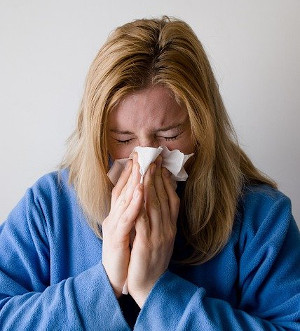A Pharmacists Guide to Soothing Sore Throats By Sheena Mitchell, Pharmacist and mum of three school going children
Unfortunately, sore throats are quite common, especially in children, and can occur for several reasons including viral or bacterial infections. Most sore throats will be treated with over-the-counter medicines and using natural remedies, as antibiotics do not help to fight a virus. The common cold virus is the biggest cause of sore throats in children of school-going age.
Causes
 Common Viruses
Common VirusesVery often a sore throat is swiftly followed by a runny nose and then a cough, a sure sign that the common cold virus is responsible. However, it is important to check for the Coronavirus too. We now know that just like the Influenza virus the Coronavirus is changing all the time in order to survive, and the symptoms change alongside the new strains.
Other viruses which can cause a sore throat in children are the Flu viruses, the Herpes Simplex virus, the Epstein Barr virus (glandular fever), and the Adenovirus. All of these viruses are highly contagious, especially in close contact settings like schools and childcare facilities.
Bacterial Infections
Bacterial infections actually only account for a third of sore throats in children and are mostly due to streptococcal infections. Babies and children are particularly likely to suffer from sore throats as their bodies haven’t yet had time to build up resistance to the infections which commonly cause this nasty symptom.
Tonsilitis
Tonsilitis is a common cause of sore throats, occurring when the two small glands at the top of your child’s throat become infected. It is usually caused by a viral infection but can occasionally be from a bacterial infection. The irony is that tonsils become infected when protecting your child’s body from infection. The tonsils are acting as a barrier to infection, so when one occurs, they isolate it and stop it from spreading to the rest of the body.
The older a child gets the less they need their tonsils as their bodies are more able to fight infection off itself and so the tonsils shrink in size. Occasionally tonsils can become a problem by the severity of which they swell, or the frequency of the condition occurring. This is when the doctor will consider the risks and benefits of removing them. A doctor will usually differentiate between viral and bacterial tonsillitis by the presence of pus-filled spots. If this is the case, then an antibiotic treatment is required, however it is viral the treatment will be the same as with other sore throats.
Others
It is important to remember that there are some reasons which are completely unrelated to contracting an infection, that may also cause the symptom of a sore throat in school age children including hay fever and excessive shouting or singing!
Symptoms
When your child has a sore throat, they may also have swollen tonsils, swollen glands in their neck and discomfort swallowing. Tonsillitis describes the inflammation of the tonsils and is mostly due to viral infections, but it can also be from a bacterial infection too.
If an infection is the cause of your child’s sore throat, they may also be suffering from symptoms such as a high temperature, runny nose, headache, aches, and be very lethargic. Watch out for a child who is not keen on eating, feels very thirsty and is generally out of sorts.
READ NEXT: A Pharmacist's Guide to Coughs and How to Manage Them
Treatment
 Medication
MedicationPain killers with Paracetamol or Ibuprofen can be used when appropriate to relieve pain and fever. Be sure to follow the dosage guidelines on the medicine and remember if you are treating a fever, you can use Ibuprofen and Paracetamol together, providing you time the medication properly within a 24-hour period. I would generally recommend trying Paracetamol first and if that doesn’t work within a couple of hours you can also give Ibuprofen for added pain relief.
Difflam Spray is an anti-inflammatory spray which can be used for children of all ages. It should be sprayed directly onto the throat area at a dose of one puff per 4kg body weight up to a maximum of four puffs every 2-3 hours. It is just for short term us, but it will provide some much-needed pain relief.
Hydration
It is important to keep your child hydrated when they are suffering from a sore throat, even though I may cause them discomfort to swallow. Filling a large drinking bottle and getting them to drink little and often is a good idea, this way you can see how much they are consuming. Ice lollies are a good option for children who are reluctant to drink.
If the cause of a sore throat is hay fever, then it is worth talking to your doctor to ensure that their condition is under control in order to prevent recurring sore throats.
Antibiotics
Antibiotics are only useful in the case of bacterial infection and will not work to treat viral throat infections. Your doctor will be able to distinguish between a viral infection and bacterial infection when examining your child’s throat. It’s really important to avoid antibiotics when they are not useful or necessary as they will actually eventually have a negative effect on your child’s health. This is because taking antibiotics on a regular basis will cause your little one to build up resistance to them. So, when your child does get a bacterial infection where they really need an antibiotic to help fight the infection, it may not work effectively, if at all.
Doctor
I would advise that parents take their child to see the doctor in the following circumstances:
- Your child’s throat is too sore to take fluids and you are worried about dehydration.
- Your child is in distress with the pain of their sore throat and pain medication is not helping.
- Your child’s voice is affected.
- Your child develops a wheeze or has difficulty breathing or swallowing.
- Your child’s sore throat is recurrent or lasts for longer than a week.
- Your child has a persistent high temperature that is not responding to Paracetamol or Ibuprofen.
READ NEXT: A Pharmacist's Guide to Helping Nasal Congestion in Children
Think Pharmacist First
Sore throats along with coughs and runny noses are the most common ailments I come across in the pharmacy when it comes to school children. Remember, your local pharmacist is a free accessible healthcare professional in your community, who can help to guide you through various at-home treatments and advise you when it is time to visit your GP.
You can find more information and tips on how to identify and treat common illnesses and conditions that affect the family on the Wonderbaba.ie pharmacy advice website. Or tune into the WonderBaba podcast for more expert advice and insights into how other families are facing their healthcare challenges head on. Find a WonderBaba Podcast on iTunes, Spotify or wherever you stream your podcasts.
